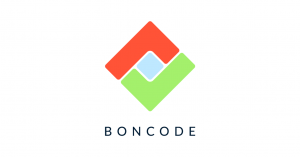BonCode co-founders – Jan Willem Klerkx, Jeroen Meetsma and Joost Koen – bring complementary skills to the company. Jan Willem provides business logic, and Jeroen delivers technical expertise. Joost keeps the organization on track and well organised. The men have two things in common – an obsession with software quality, and the belief that software should be treated as a valuable business asset. This is their story, the story of BonCode, and the story of why software quality matters.
Jan Willem Klerkx
“I have always seen corporate software systems as core strategic business assets that deserve attention from higher management, it is not only the tech people who should carry the responsibility for business agility and security.”
Jan Willem Klerkx, CEO & Co-founder, BonCode
Prior to co-founding BonCode, Jan Willem Klerkx had a long career in software and sales. Given research shows that more than 50% of software projects fail, Jan Willem quickly saw the value of high-quality software as a business asset. That’s why, to this day, he’s fully committed to helping reduce the number of software failures.
Two things color his experience of the IT industry: successful mid-sized companies and strong technical teams. In fact, it’s his uncompromising attitude to software quality that led Jan Willem to co-found BonCode – source code analytics for people at every level within an organization.
Jan Willem is the first to admit that BonCode is one of many software quality services on the market. After all, at one time he and Jeroen both worked for the same competitor. So if the sector offers products and services that share similar features, what sets BonCode apart?
Run by a team of software industry enthusiasts – and IT veterans – at its core, BonCode is a group of experts who understand the challenges of quality in the software business. It’s fair to say that Jan Willem, Jeroen, and the rest of their team are fanatical about quality software.
After turning around the fortunes of a pre-existing Quality Assurance (QA) software product – of which he was a major shareholder – Jan Willem decided it was time to launch a software quality consultancy. The idea for BonCode was born. Directing his energies into improving the software industry made total sense. But he couldn’t do it alone. That’s why he teamed up with Joost, who happens to be Jan Willem’s first employer. Joost has a track record in building robust and profitable companies, either as a co-founder, or as a business coach. But measuring software quality, as was the plan, requires tooling.
That’s when Jan Willem and Joost teamed up with Jeroen Meetsma, who is still BonCode’s CTO.
Jeroen Meetsma
“Measuring and monitoring quality enables technical teams to tell a story to management based on objective facts.”
Jeroen Meetsma, CTO & Co-founder, BonCode
Back in the early 2000s, Jeroen Meetsma was a self-employed software developer. At that time, the Internet could be slow and frustrating. Online grocery shopping was new – not the phenomenon it is today. So when Jeroen single-handedly took over the web application for a premium Dutch retailer, he began by cleaning up the code.
Part of this clean-up involved taking five existing codebases – one for each type of store – and reducing them to just one. Why? The previous development team had copied the same codebase five times. That meant every time there was a change – big or small – it needed to be carried out manually, five times. This made the system vulnerable to errors.
Using parameters, Jeroen set up one codebase for five stores. This reduced the size of the codebase but also improved the quality, reliability, and ease of maintenance. Productivity went up, as did the website’s functionality and capability. But try explaining that to non-technical business leaders over twenty years ago! It was then that Jeroen became interested in software code analysis, delivering metrics as a means to assess code quality.
In those days, most people would assume that a developer producing more code was being more productive. The truth is that by removing unnecessary code and bringing in the ability to make one change and update it everywhere led to greater efficiency. Demonstrating this is much easier when you have objective data that anyone can understand.
Jeroen discovered that measuring code quality and conveying the business benefits to non-technical business leaders was a big challenge. It was whilst working for the tax authority in the Netherlands that Jeroen was introduced to a company that specialized in measuring code quality using a specific set of metrics.
One metric that seemed to resonate strongly with business leaders was duplication – copying and reusing sections of code. To a non-technical person, duplication creates quantity and an illusion of productivity – when in reality it gives companies many more lines of code to manage and maintain.
Improving code quality results in fewer bugs. At the same time, as productivity goes up, so does the ability and agility to add new features and functionality. In the case of the supermarket chain, new business rules around offers and prices could be implemented within one day by a single developer. All thanks to better quality software.
Jeroen quickly learned how to tell a story to management using objective facts. It was the missing link. So in his spare time, he began writing a tool to perform source code analysis, refining the metrics used to assess software quality and make it more beneficial to companies. It was around this time that he crossed paths with Jan Willem and Joost, and BonCode was born.
Trusted experts in software quality
Today, BonCode’s tool-based consultancy brings expertise in quality to software products and processes. It’s a combination of robust quality management tools – software assessment and software monitoring – and consultancy. BonCode has five main types of customer:
- Those who’ve already paid the price of poor software quality and have learned to monitor quality from the start.
- Companies that live and breathe quality in all aspects of their business, so software quality is simply an extension of that.
- Newly appointed software managers, who’ve inherited a legacy tech stack and need to clean up an existing software mess.
- Companies that need support with decision-making around the usefulness of a software product through independent and impartial advice on software quality.
- Companies that need support in their Due Diligence process, where we take the software part of the Due Diligence.
Together with the quality of its software assessment and monitoring consultancy, cultural fit is one of the key reasons why companies choose BonCode. As trusted experts, BonCode doesn’t just deliver dashboards of data and reports, it brings together people from across an organization to start meaningful conversations around quality.
Let’s be honest; in most companies, few people at board level are overly interested in software quality. That is, until they feel the impact of poor-quality software and development practices on the bottom line. For Jan Willem and Jeroen, putting software quality on the agenda – and keeping it there – is important for three reasons:
- Meeting the ongoing business need for secure and maintainable software.
- Protecting business-critical software and ensuring operational stability.
- Building quality software faster and more productively.
To uncover what BonCode’s source code analytics can do for software quality and risk management in your organization, book a demo.





